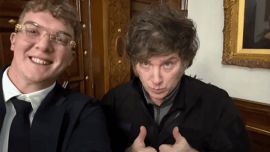Comment on the state-of-the nation speech to open Congress last Wednesday by President Alberto Fernández will be found elsewhere in today’s newspaper – the aim of this column is to supply historical background to this tradition, especially my own personal newsroom experience (which spans covering all the “39 steps” since the return of democracy in 1983, one way or another).
The tradition long predates that experience, going all the way back to 1864. Then-president Bartolomé Mitre did the honours on that historic occasion but thereafter skipped opening Congress – partly because of campaign absences during the Paraguayan War and partly because while not averse to public speaking, he preferred flowery oratory in the style of President Fernández in Antarctica last month to reading out a shopping-list of upcoming legislation. He therefore delegated this task to his vice-president Marcos Paz – no prizes for guessing why this option of passing the speech onto his veep did not occur to President Fernández last Wednesday.
Mitre was not the only president to shun this event. If 1864 was the first opening of a Congress, 1917 was the first for a democratically elected parliament (or at least by universal and compulsory manhood suffrage) and the notoriously publicity-shy Radical Hipólito Yrigoyen could hardly be less up to the occasion, making his veep Pelagio Luna read out a four-paragraph written message in his absence.
Space reasons conspire against coverage of the speeches to open Congress between then and those personally experienced in the current democratic period, some more memorable (Juan Domingo Perón in 1946 to herald a new era) than others. All these speeches through to 1995 were delivered in May – not until the 1994 constitutional reform was the inauguration of Congress brought forward to March 1 so it would seem that low parliamentary productivity is nothing new.
Turning to my personal experience, the May Day of the Orwellian year of 1984 marking the return of parliamentary activity with democracy was my first state-of-the-nation. Having deployed his more idealistic rhetoric at his Human Rights Day inauguration the previous December and with the initial euphoria already fading, the Radical Raúl Alfonsín was down-to-earth in his 50-minute address, talking about the “gigantic challenge” of improving real wages, halting inflation and battling a massive debt overhang – how much has changed since then? The next year was the first of many examples of the road map announced to Congress being quickly overtaken by events with the 1985 Austral Plan (a price freeze with wage restraints) following the next month. The 1986 state-of-the-nation speech amazed everybody by proposing the transfer of the capital to Viedma (never reality yet never really repealed in over three decades either) but thereafter the wheels began coming off the Austral Plan and Alfonsín’s human rights bandwagon (following the 1986-1987 amnesty legislation) with the state-of-the-nation speeches of his last three years increasingly abstract.
Peronist Carlos Menem had been in power for 10 months before his first state-of-the-nation in 1990 and he used it to turn his populist election campaign on its head, confidently announcing a “true capitalism” with privatisation and deregulation – “the true test of courage is to face reality,” he declaimed. In 1991 convertibility was in its first month but its success still hung in the balance so Menem changed the subject to an overacted zeal against corruption and drug-trafficking. But the next year he could already boast an influx of foreign investment with federalism his central theme in 1993 while in 1994 Menem could celebrate the Olivos Pact leading to constitutional reform opening up a second term. In 1995 came the switch to March 1 (a fortnight before his son’s death), thus escaping delivery on the eve of his mid-May re-election with half the vote (despite peak unemployment of 18.5 percent the same month) but it was a campaign spiel anyway. Menem’s second term (1995-1999) was one long and ultimately unsuccessful bid to clinch a third with his state-of-the-nation speeches part of that futile quest and thus not worth much analysis.
The millennial speech of his Radical successor Fernando de la Rúa in 2000 was perhaps the shortest ever (43 minutes) – it was centred on his labour reform, which was to be the beginning of the end for his presidency via the Senate bribery scandal, and included an outburst against “damned cocaine” in order to come across as the tough guy nobody imagined him to be. While expressing confidence in the “blindaje” of US$40 billion from the International Monetary Fund, De la Rúa spoke of a “difficult moment” in 2001, which was the ultimate understatement for the meltdown to come. Caretaker president Eduardo Duhalde had to talk his way around his maxi-devaluation and pulverisation of dollar savings in 2002.
Which brings us to the dozen years of the Kirchners. Néstor’s first state-of-the-nation in 2004 vowed to place the “internal debt” above the external while disavowing default. Buoyed by global commodity prices and “Chinese” growth, he could boast his model without much challenge in the remaining three years of his term. Space restrictions are clearly incompatible with the 1,138 minutes (almost 19 hours) of Cristina Fernández de Kirchner’s self-congratulatory state-of-the-nation speeches during her two terms (2007-2015) so I will spare the reader and myself but it must be said that her delivery without notes (never faltering even with an infinity of usually meretricious statistics) was impressive.
Maurico Macri’s maiden state-of-the-nation speech in 2016 included tax breaks but is best-known for the three main challenges he set himself – “zero poverty,” the fight against drug-trafficking and Argentine unity. Bullish in 2017, Macri claimed “the worst is behind us” in 2018 (still not today). Following the double-digit slump of the first Covid-stricken year, the state-of-the-nation speeches of the current presidency have been epics of economic recovery with the pandemic and the Ukraine war excusing any shortfalls – the general assumption is that we heard the last of them last Wednesday.



















Comments